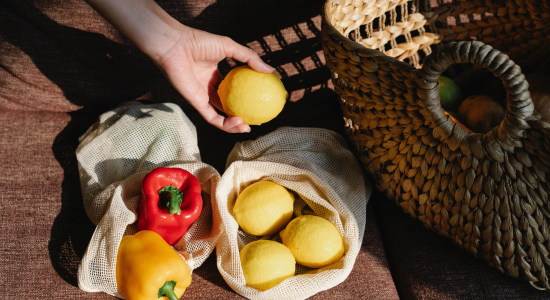Considerations About Becoming Plant-Based

Photo by Sarah Chai
Living sustainably means considering the environmental impact of your consumption in all areas of your life. This includes the foods that fuel our bodies. A plant-based diet is based on foods that are not heavily processed and come from plants. Following a plant-based diet comes with a variety of health benefits including reducing the risk of type 2 diabetes, heart disease, and certain cancers, while also reducing inflammation and boosting energy levels.
While many people use “plant-based” and “vegan” interchangeably, there are a few key differences. Vegan diets eliminate all animal products such as dairy, meat, poultry, fish, eggs, and honey. With a plant-based diet, the majority of products come from plant-based sources, but you can choose whether or not to consume animal products. Whether you decide to become plant-based, vegan, flexitarian, etc. it is a personal choice depending on your lifestyle and your needs. However, by choosing to reduce our consumption of meat and animal products to even just a few meals a week, we can reduce our carbon footprint and help mitigate climate change.
If you’re considering transitioning to plant-based or want to reduce your consumption of animal products, start small with a few simple changes.
- Cook a vegetarian meal at least once a week. Pick a vegetable you love that’s currently in season and challenge yourself to build an entire meal around it. You can encourage your kids to choose some ingredients they like and get them excited to cook together. Create a family recipe book, when you find a meal that your family likes, record it and ask your kids to draw the illustrations.
- Make healthier swaps. Trade butter for olive oil, coconut oil, avocado oil, nut butters, or vegan butter instead. Stock up on seasonal fruit and choose a ripe piece of fruit for dessert instead of a processed option. Consider swapping hummus and veggies in place of chips and dip during snack time.
- Try vegan or vegetarian alternatives to your favorite recipes. You don’t have to completely overhaul your meal plan, instead get creative and find delicious substitutes for meat in your favorite recipes. If you love chili, consider using different types of beans instead of ground meat. If you always eat eggs for breakfast, try a tofu scramble one morning instead. You might surprise yourself with how much you like the plant-based alternatives.
- Get inspired. Check out some popular vegan and vegetarian chefs on Instagram or Youtube for some recipe inspo. We recommend Maya Leinenbach @fitgreenmind, Pierce Abernathy @pierceabernathy, Max La Manna @maxlamanna, and Ella Woodward @deliciouslyella.
- Plan your meals in advance. Just like you’re prepping your little one's lunch for the next day, plan your meal schedule in advance. Choose a recipe you’re excited about and stock up on the groceries you need. When it’s time for dinner you won’t be as tempted to order takeout if your pantry is already stocked.
SOURCES: